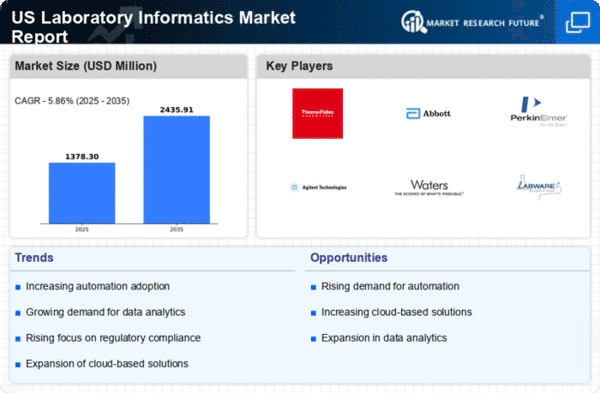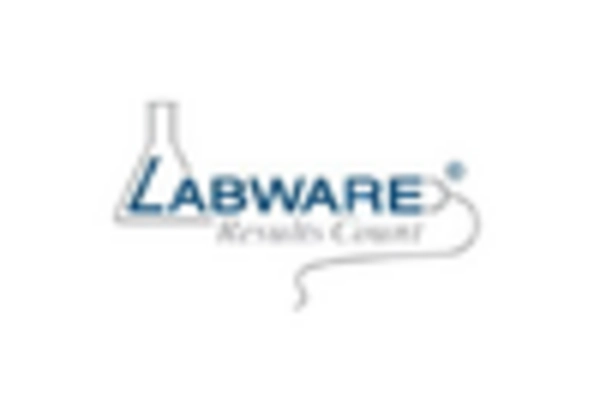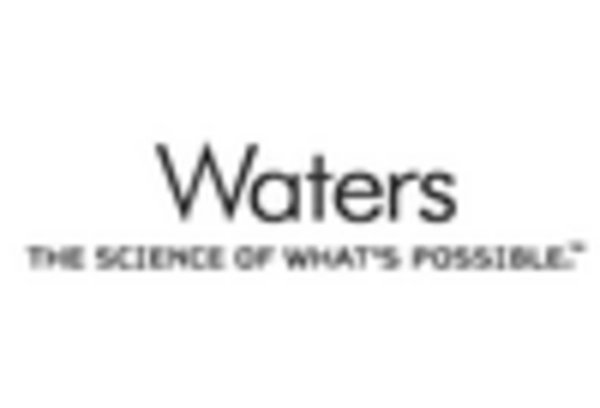Rising Demand for Data Management Solutions
The laboratory informatics market is experiencing a notable surge in demand for advanced data management solutions. As laboratories generate vast amounts of data, the need for efficient data handling and analysis becomes paramount. This trend is driven by the increasing complexity of laboratory operations and the necessity for real-time data access. In the US, the market for laboratory informatics solutions is projected to reach approximately $3 billion by 2026, reflecting a compound annual growth rate (CAGR) of around 10%. Laboratories are seeking integrated systems that can streamline workflows, enhance data integrity, and facilitate collaboration among researchers. Consequently, the rising demand for data management solutions is a critical driver in the laboratory informatics market, as organizations strive to optimize their operations and improve research outcomes.
Expansion of Biobanking and Genomic Research
The expansion of biobanking and genomic research is significantly impacting the laboratory informatics market. As the demand for personalized medicine and genomic studies grows, laboratories are increasingly focused on managing large datasets associated with biobanks. In the US, the biobanking sector is projected to grow at a CAGR of 11% over the next five years, driving the need for robust informatics solutions. Laboratories require systems that can efficiently handle the storage, retrieval, and analysis of genomic data, which is often complex and voluminous. This trend indicates that the laboratory informatics market is evolving to meet the specific needs of biobanking and genomic research, making it a crucial driver for future growth.
Increased Collaboration in Research Initiatives
The laboratory informatics market is being driven by increased collaboration in research initiatives across various sectors. As interdisciplinary research becomes more prevalent, laboratories are seeking informatics solutions that facilitate data sharing and collaboration among researchers. This trend is particularly evident in the US, where collaborative research projects are on the rise, leading to a projected market growth of 8% annually. Laboratories are investing in informatics systems that support collaborative platforms, enabling researchers to access shared data and insights more efficiently. This collaborative approach not only enhances the quality of research but also accelerates the pace of scientific discovery. Therefore, the increased collaboration in research initiatives serves as a vital driver in the laboratory informatics market, fostering innovation and knowledge exchange.
Growing Emphasis on Data Security and Compliance
In the laboratory informatics market, there is a growing emphasis on data security and compliance with regulatory standards. Laboratories are increasingly aware of the risks associated with data breaches and the importance of safeguarding sensitive information. As regulations become more stringent, particularly in sectors such as pharmaceuticals and biotechnology, the demand for informatics solutions that ensure data integrity and compliance is rising. In the US, the market for laboratory informatics solutions that prioritize security features is projected to grow by 12% annually. This trend indicates that organizations are investing in systems that not only streamline operations but also protect against potential data vulnerabilities. The focus on data security and compliance is a significant driver in the laboratory informatics market, shaping the development and adoption of new technologies.
Technological Advancements in Laboratory Equipment
Technological advancements in laboratory equipment are significantly influencing the laboratory informatics market. Innovations such as automated systems, high-throughput screening, and advanced analytical instruments are reshaping laboratory workflows. These advancements enable laboratories to enhance productivity, reduce human error, and improve the accuracy of results. In the US, the integration of cutting-edge technologies is expected to propel the laboratory informatics market, with an estimated growth rate of 9% annually over the next five years. As laboratories adopt more sophisticated equipment, the demand for compatible informatics solutions that can seamlessly integrate with these technologies is likely to increase. This interplay between advanced laboratory equipment and informatics solutions is a key driver, fostering a more efficient and effective research environment.

















Leave a Comment